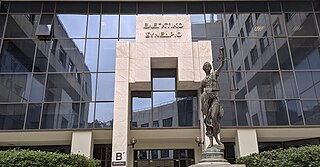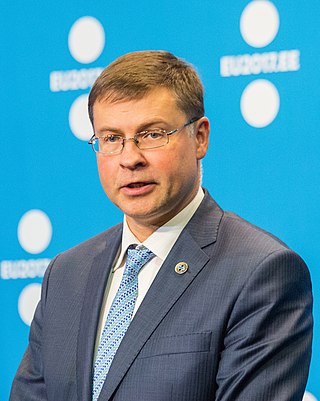
The European Commission (EC) is the primary executive arm of the European Union (EU). It operates as a cabinet government, with 27 members of the Commission headed by a President. It includes an administrative body of about 32,000 European civil servants. The commission is divided into departments known as Directorates-General (DGs) that can be likened to departments or ministries each headed by a Director-General who is responsible to a Commissioner.

An audit is an "independent examination of financial information of any entity, whether profit oriented or not, irrespective of its size or legal form when such an examination is conducted with a view to express an opinion thereon." Auditing also attempts to ensure that the books of accounts are properly maintained by the concern as required by law. Auditors consider the propositions before them, obtain evidence, roll forward prior year working papers, and evaluate the propositions in their auditing report.

The European Court of Auditors is the supreme audit institution of the European Union (EU). It was established in 1975 in Luxembourg and is one of the seven EU institutions. The Court comprises one member from each EU member state supported by approximately 800 civil servants.
An audit committee is a committee of an organisation's board of directors which is responsible for oversight of the financial reporting process, selection of the independent auditor, and receipt of audit results both internal and external.

An external auditor performs an audit, in accordance with specific laws or rules, of the financial statements of a company, government entity, other legal entity, or organization, and is independent of the entity being audited. Users of these entities' financial information, such as investors, government agencies, and the general public, rely on the external auditor to present an unbiased and independent audit report.

The Directorate-General for Mobility and Transport is a Directorate-General of the European Commission responsible for transport within the European Union.

In Greece, the Hellenic Court of Audit is the supreme audit institution of the Hellenic Republic, auditing the use of public funds in Greece according to the principles of legality, regularity and sound financial management. Synedrio is also the Supreme Financial Court, one of the three Supreme Courts of Justice, grounded on the Constitution, provides for its jurisdictional, advisory and auditing competences.

The Directorate-General for Economic and Financial Affairs is a Directorate-General of the European Commission. The DG ECFIN is located in Brussels, Belgium, and Luxembourg. Its main responsibility is to encourage the development of Economic and Monetary Union both inside and outside the European Union, by advancing economic policy coordination, conducting economic surveillance and providing policy assessment and advice.

The Directorate-General for Financial Stability, Financial Services and Capital Markets Union is a Directorate-General (DG) of the European Commission. It is one of the thirty three DG's that are created and named to reflect their functions.

The Executive Vice President of the European Commission for An Economy that Works for People is the member of the European Commission responsible for economic and financial affairs. The position was previously titled Commissioner for Economic and Monetary Affairs and the Euro and European Vice President for the Euro and Social Dialogue from 2014 to 2019. The current executive vice president is Valdis Dombrovskis (EPP).

The Commissioner for Internal Market is a member of the European Commission. The post is currently held by Commissioner Thierry Breton.

The European Civil Service is a generic term applied to all staff serving the institutions and agencies of the European Union (EU). Although recruitment is sometimes done jointly, each institution is responsible for its own internal structures and hierarchies.

The Body of European Regulators for Electronic Communications (BEREC) is the body in which the regulators of the telecommunications markets in the European Union work together. Other participants include representatives of the European Commission, as well as telecommunication regulators from the member states of the EEA and of states that are in the process of joining the EU.

The Directorate-General for Energy, or ENER, is a Directorate-General of the European Commission, created on 17 February 2010 when it was separated from the Transport DG, with which it had been combined since 2000.
The chief audit executive (CAE), director of audit, director of internal audit, auditor general, or controller general is a high-level independent corporate executive with overall responsibility for internal audit.

The Office of the Comptroller and Auditor General of Bangladesh (C&AG) is the Supreme Audit Institution (SAI) of the country. Like the SAIs in many other countries across the world the institution is established by the Constitution of Bangladesh. This institute is responsible for maintaining accounts of the republic and audits all receipts and expenditure of the Government of Bangladesh, including those of bodies and authorities substantially financed by the government. The reports of the CAG are discussed by the Public Accounts Committee, which is a standing committee in the Parliament of Bangladesh.
The Model Audit Rule 205, Model Audit Rule, or MAR 205 are the commonly applied terms for the Annual Financial Reporting Model Regulation. Model Audit Rule is a financial reporting regulation applicable to insurance companies, and borrows significantly from the Sarbanes Oxley Act of 2002. The Model Audit Rule is co-developed by the American Institute of Certified Public Accountants (“AICPA”) and National Association of Insurance Commissioners (“NAIC”) and issued by NAIC with revisions in 2006 and has taken effect in 2010.

The European Commissioner for Financial Stability, Financial Services and the Capital Markets Union is the member of the European Commission responsible for banking and finance. The current officeholder is Mairead McGuinness.
The Jammu and Kashmir Administrative Service is the administrative civil service of the Indian union territory of Jammu and Kashmir. The officers for this post are recruited by the Jammu and Kashmir Public Service Commission through an exam which is known as JKAS examination. The statewide combined competitive examination is conducted for recruitment of various state civil service. While the Jammu and Kashmir Accounts Service is a civil service responsible for overseeing the Financial Administration and Management of the Union territory of Jammu and Kashmir. Its primary responsibility is safeguarding the state's exchequer and public funds. Officers for this role are selected through the JKAS examination conducted by the Jammu and Kashmir Public Service Commission. "















